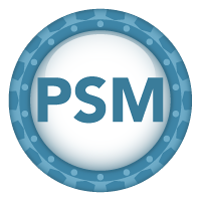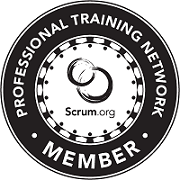Call Us
 (+65) 6227 2883
(+65) 6227 2883
 |
 |
Accredited by Scrum.org, The Home of Scrum, the 2-day PSM course teaches what is at the heart of the Scrum and Agile movement. It covers the principles and process theory underpinning the Scrum framework and the role of the Scrum Master in it. The course also teaches how to use Scrum, how to optimise value, reduce total cost of ownership and deliver more frequently.
Participants learn through instruction and team-based exercises, and are challenged to think on their feet to better understand what to do when they return to their workplaces.
Over the 2 days, participants will see why PSM is the cutting-edge course for effective Scrum Masters and for anyone coaching a development team toward increased efficiency and effectiveness. The course includes advanced thinking for servant-leadership and behavioural shifts.
The PSM course is much more than just a set of slides and an instructor. In this course, students work on real-life cases with other classmates together as a team. The course features discussions and hands-on exercises based on real-life cases.
Scrum.org accredited courses provide the highest quality Scrum training, materials and certified Professional Scrum Trainers (PSTs) to teach them. The training materials are created and maintained by Scrum co-creator Ken Schwaber, Scrum.org and the community of PSTs who teach the courses, thereby ensuring they are in tune with what’s happening in software development organisations and always up-to-date with the latest practices.
Professional Scrum Trainers bring their own style and experience to the courses, but use the same materials so that students are learning from the same content regardless of who teaches the course or where it is taught around the world. Read more about the differences.
By the end of this course participants will:
|
"Excellent course and case studies to reinforce the SCRUM framework." "Great trainer. I enjoyed the whole session" "The class is fun. There are a lot of case studies to let us express our opinion on. Good job & keep going!" |
The Professional Scrum Master course is for anyone using the Scrum framework. It is particularly beneficial for those people within an organisation accountable for getting the most out of Scrum, including Scrum Masters, managers, and Scrum Team members.
Typical attendance includes:
|
"This was an excellent and very worthwhile course. I learnt a lot that we can start implementing in my work." |
What is Scrum and how has it evolved?
Why does Scrum work and what are its core principles? How are the Scrum principles different from those of more traditional software development approaches, and what is the impact?
How Scrum theory is implemented using time-boxes, roles, rules, and artefacts. How can these be used most effectively and how can they fall apart?
Scrum is different: what does this mean to my project and my organisation? How do I best adopt Scrum given the change that is expected?
A system isn’t just developed, it is also sustained, maintained and enhanced. How is the Total Cost of Ownership (TCO) of our systems or products measured and optimised?
Scrum Teams are self-organising and cross-functional; this is different from traditional development groups. How do we start with Scrum teams and how do we ensure their success?
Plan a project and estimate its cost and completion date.
Scrum is empirical. How can predictions be made, risk be controlled, and progress be tracked using Scrum. Discussion starts with “Done and Undone” and continues with Quality Assurance in Scrum.
Scrum works great with one team. It also works better than anything else for projects or product releases that involve hundreds or thousands of globally dispersed team members. How is scaling best accomplished using Scrum?
|
"Really great course that I can hopefully translate to the workplace and share with the team." |
Professional Scrum Master Course + Certificate Exam
$1450 + gst per person
The Scrum.org Professional Scrum Master is a prestige certification that has two levels of certification: PSM I and PSM II. When you take this course you will receive a voucher to take the PSM I assessment. The exam is taken online after the course. The cost of the first attempt is included in the price of the PSM class.
If you take the exam within 14 days of the course you become eligible for a 2nd attempt at no extra cost. The reason for this is that when you attend a Scrum.org training class you learn the importance of inspection, adaptation, and fast feedback cycles. To reinforce these concepts you are encouraged to avoid undue delay and to take your assessment promptly, within 14 days of course attendance. If you do not achieve the required score, you will be given a 2nd attempt at no additional cost.
Students of Scrum.org courses are able to claim Project Management Institute (PMI) PDU credit: 14 PDUs after attending a two-day Professional Scrum Master (PSM). Please note that PMI PDUs are earned for course attendance and not for passing a Scrum.org assessment. Students can claim PDUs under PMI's "Education courses provided by other third party providers” category. You can claim your PDUs online at https://ccrs.pmi.org.
New Holistic Approach to Modern IT to be Presented at DevOps Connect Event in Dallas.
Boston and Boca Raton, Fla.– April 4, 2017 – Scrum.org, the mission-based organisation dedicated to improving the profession of software delivery through training, certification, assessments, tools, processes and community, and the DevOps Institute (DOI), the global learning community around emerging DevOps practices that delivers enterprise-level DevOps training and certification, today announced a strategic partnership. The initiative will help IT organizations change the way they approach software product delivery with a collective approach known as ScrumOps. Read more...